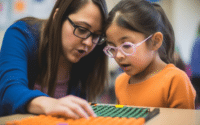What Is the Role of Special Education Teachers in an Inclusive Classroom?
The adoption of inclusive education strategies has rapidly increased in recent decades. With this, specially-abled students are immersed in classrooms with their developing peers. According to a recent study of the U.S., above 60% of students with disabilities spend at least 80% of their school day in general education classrooms.
Inclusive learning helps students in the classroom by offering personalized, thoughtful instruction and promoting individuality and equity. But developing an integrated learning environment is not easy. Special education teachers play a crucial role in this.
When you enrol yourself in a special education teacher training course, you could know about these in detail. Here, we have discussed the role of an SEN teacher in inclusive learning for your basic understanding –
-
Curriculum design
Special education teachers craft lessons for inclusive classrooms to make sure students with disabilities are considered. Teachers may work together to build a curriculum accessible to all types of students. Or, a special education teacher can modify the lesson plan of a general education teacher.
Besides, an SEN teacher can create supplemental learning materials for specific students, including manipulative, visual, technology resources, text, and determine when one-to-one lessons will benefit students.
When crafting lessons, teachers should examine students’ strengths, weaknesses, interests, and communication methods. The student’s IEP should be carefully followed to meet achievements goals.
As many general education teachers have limited training in inclusive learning, the SEN teachers need to help the instructor understand why specific accommodations are necessary and how to incorporate them.
-
Classroom instructions
Most of the inclusive classrooms are based on a co-teaching model. With this, most teachers are present all day. There are exceptions too. Others use a push-in model, where special education teachers offer lessons at certain times during the day.
Without extensive cooperation between general and special education teachers, it is not possible to implement an inclusive classroom effectively. SEN teacher closely monitors the progress of students and provide any special instructions if needed. And based on their needs, students need varying levels of individual instructions and assistance.
Besides, teachers can also pull students out of the classroom for a senior activity or one-to-one lessons. Also, they can arrange a time with speech therapists, counsellors, dyslexia coaches, and other specialized personnel. SEN teachers should ensure that therapists or professionals are present in the classroom at certain times to assist the students.
And to maintain a favourable climate, they can assist the general educations teachers in presenting lessons to the whole class, enforcing rules, grading papers, and other classroom routines. General and special education teachers can break classes into smaller stations or groups to offer more significant engagement opportunities.
-
Learning assessments
Another rule of special education teachers in an inclusive classroom is to conduct regular assessments to check whether the students are achieving academic goals or not. Lessons can be evaluated periodically to determine whether these are sufficiently challenging without overwhelming the students.
Students can have a feeling of general independence in general education settings but can also feel sufficiently supported. SEN teachers can also organize periodic IEP meetings with each student, their family, and some staff members to decide whether adjustments need to make to the student’s plan.
-
Advocating for students
SEN teachers work as advocates for special needs children. It includes ensuring that all school officials and employees understand the need for inclusion and implementing inclusion in all campus activities. Besides, advocacy can also include requesting inclusion-focused professional development activities or offering information to community members about the success rates of inclusive teaching.
Effective communication with parents is also vital for the success of an inclusive classroom. Families should receive regular updates on children’s academic, emotional, and social development through emails, phone calls, and other communications mean.
If you are an aspiring special education or general education teacher, pursuing an online teacher training course can help you build a greater understanding. So, without waiting any further, choose a renowned institution like APTTI and enrol in a course today!
Image Source: Freepik.com


